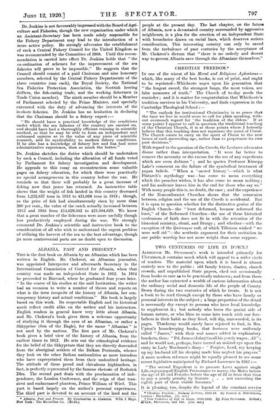CHRISTIAN FREEDOM.*
IN one of the wisest of his Moral and Religious Aphorisms—
which, like many of the best books, is out of print, and ought to be reprinted—Whicheote urges upon his generation that " the longest sword, the strongest lungs, the most voices, are false measures of truth." The Church of to-day needs the reminder ; and it is matter for congratulation that Whichcote's tradition survives in his University, and finds expression in the Cambridge Theological School :-
" The outlook for institutional Christianity is so grave that the time we live in would seem to call for plain speaking, with- out overmuch regard for the tradition of the elders.' If at some points I appear to call in question the traditional teaching of the Christian Church, it is at those points whore I honestly believe that this teaching does not represent the mind of Christ. The Church exists to carry on the spirit of Christ to the new issues of each succeeding ago, rather than to perpetuate its own Past decisions."
With regard to the question of the Creeds, the Lecturer advocates disuse rather than interpretation. " It were far better to remove the necessity or the excuse for the use of any expedients which are even dubious " ; and he quotes Professor Kirsopp Lake's comment on the failure of the symbolical treatment of pagan beliefs. " When a ' sacred history '—which is what Plutarch's mythology was—has come to mean everything which the preacher wishes, it has also come to mean nothing ; and his audience leaves him in the end for those who say so." With many people this is, no doubt, the case ; and the experience of the Nonconformist Churches shows that the connexion between religion and the use of the Creeds is accidental. But it is open to question whether for the distinctive genius of the English Church—the " least deformed, because reformed the least," of the Reformed Churches—the use of these historical confessions of faith does not fit in with the retention of the historical ministry, ritual, and liturgy ; and whether—with the exception of the Quicunque vult, of which Tillotson wished " we were well rid "—the aesthetic argument for their recitation in our public worship has not more weight than some suppose.






































 Previous page
Previous page